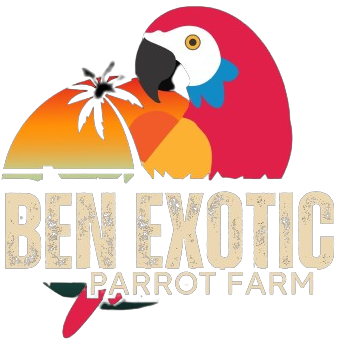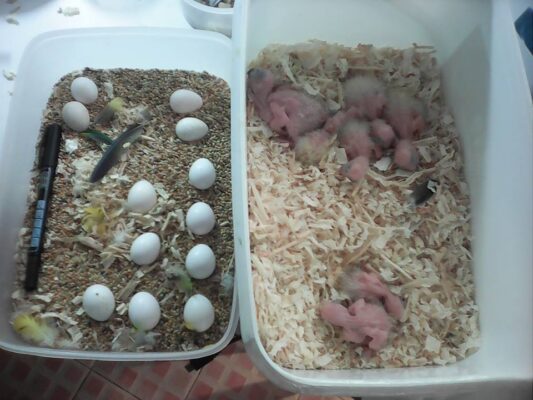waar koop ik broedeieren voor papegaaien
Where to Buy Parrot Eggs for Breeding: A Complete Guide
Parrot breeding is a rewarding but complex activity. If you’re looking for where to buy parrot eggs, you need to make sure you’re getting them from reliable sources. In this guide, we will help you navigate the best places to buy parrot eggs for breeding and what to consider when making your purchase.
Understanding the Importance of Reliable Sources
When buying parrot eggs, the most crucial factor is the source. It’s essential to buy from trusted breeders who ensure the health and quality of the eggs. A reputable breeder will offer you not only eggs but also guidance on hatching and caring for the baby parrots.
Online Breeders: Convenience Meets Quality
The internet has made it easier to find parrot eggs for breeding. Several online platforms sell parrot eggs, including websites run by breeders. Here are some things to look out for when purchasing online:
- Check Reviews: Reviews from other buyers can give you insights into the quality of the eggs and the service.
- Health Guarantees: Many breeders offer health guarantees for their eggs, which is crucial for successful hatching.
- Shipping Process: Eggs must be shipped safely to ensure they arrive intact. Look for sellers who have excellent shipping records.
Specialized Parrot Breeders: A Safe Option
If you’re new to breeding parrots, buying from specialized parrot breeders is a wise choice. These breeders often have years of experience and can provide you with valuable advice on incubation, diet, and care.
- Variety of Species: Many specialized breeders offer a variety of parrot species, allowing you to choose the one that suits your needs.
- Post-Sale Support: Reliable breeders often offer post-sale support, helping you with the hatching process and the initial stages of caring for the newborn parrots.
Local Aviaries: A Hands-On Approach
Visiting local aviaries can be an excellent way to purchase parrot eggs. Unlike online purchases, buying locally allows you to see the conditions in which the birds are kept.
- Inspect the Environment: You can verify if the birds are kept in healthy, clean environments, which affects the quality of the eggs.
- Personalized Advice: Local breeders can provide you with face-to-face advice on caring for the eggs and future chicks.
What to Look for When Buying Parrot Eggs
Before making a purchase, it’s important to consider a few critical factors:
- Egg Condition: Make sure the eggs are clean and free from cracks or damage.
- Egg Age: Fresh eggs are more likely to hatch successfully. Always ask the seller when the eggs were laid.
- Species: Different parrot species have different requirements. Ensure you have the correct incubator setup for the species you’re purchasing.
Legal Considerations: Ensure Compliance
It’s important to note that not all parrot eggs can be bought or sold freely. Certain parrot species are protected by law, and you may need a permit to purchase or breed them.
- Check Local Laws: Make sure you’re aware of the legal requirements in your area before making a purchase.
- Endangered Species: Avoid buying eggs from endangered species without proper permits, as this could lead to legal consequences.
Conclusion: Make an Informed Decision
Purchasing parrot eggs for breeding is an exciting endeavor, but it requires careful planning. Whether you choose to buy from an online breeder, a specialized breeder, or a local aviary, make sure to prioritize the health and quality of the eggs. With the right research and preparation, you’ll have a successful hatching experience.
Tips for Successful Parrot Egg Incubation
Once you’ve purchased your parrot eggs, the next crucial step is incubation. Successful incubation requires the right equipment and attention to detail. Here are some essential tips to help you along the way:
Use a Quality Incubator: Invest in a reliable incubator that allows you to control temperature and humidity precisely. A good incubator will increase your chances of a successful hatch.
Monitor Temperature and Humidity: Parrot eggs require a specific temperature range, usually between 99.3°F to 99.6°F (37.4°C to 37.6°C). Humidity levels are also important, typically around 40-50% during incubation and 65-70% during the final hatching days.
Turn the Eggs Regularly: It’s important to turn the eggs several times a day to prevent the embryo from sticking to the eggshell. Most incubators come with automatic egg-turning functions, but if yours doesn’t, manual turning will be necessary.
Candling the Eggs: This is a process where a bright light is shone through the egg to check for signs of development. Candling can help you track the progress of the embryo inside the egg. It’s usually done on days 5-7 and again on days 14-17 of incubation.
Handling Newly Hatched Parrots
After successful hatching, the real work begins. Baby parrots need special care, particularly in the first few weeks of life. Here are some quick tips for managing newborn parrots:
Keep the Brooder Warm: Newborn parrots are extremely sensitive to temperature changes. A brooder with controlled warmth (around 95°F or 35°C) is necessary for their survival in the first few weeks.
Feeding Schedule: Hand-feeding is often necessary for newly hatched parrots. A specialized hand-feeding formula designed for parrot chicks should be used. Feeding intervals can range from every 2-4 hours depending on the species and age of the chicks.
Monitor Growth and Health: Keep a close eye on the chicks’ growth and development. Weighing them daily can help you ensure they’re gaining weight appropriately. If you notice any issues, it’s crucial to consult a vet specializing in avian care.
Finding a Vet for Exotic Birds
Finding a qualified avian vet is a key part of caring for parrots, especially when they’re young or in the early stages of development. Regular check-ups will help ensure that your parrots are healthy. Here are some ways to find a good vet:
Ask Breeders for Recommendations: Many breeders have trusted veterinarians that specialize in birds. Ask them for a referral.
Search Online: There are websites and directories dedicated to exotic animal vets. Look for those with good reviews and certifications in avian medicine.
Local Aviaries and Bird Communities: Bird enthusiasts often share valuable information on local avian vets. Visit local bird communities or online forums for recommendations.
Final Thoughts: Patience and Preparation Are Key
Breeding parrots and successfully hatching their eggs is an intricate process that demands patience, preparation, and attention to detail. From selecting a reputable source to ensuring the right incubation conditions and caring for newly hatched chicks, every step is crucial. With the right knowledge and commitment, you can raise healthy, happy parrots and enjoy the rewarding experience of breeding these beautiful birds.
Caring for Growing Parrot Chicks
As your parrot chicks grow, their needs will change. It’s important to stay on top of their development and adjust your care routine accordingly. Here’s how to care for your parrot chicks as they transition from newborns to young birds:
Weaning Process: At around 8-12 weeks, depending on the species, parrot chicks will begin the weaning process. This is when they transition from hand-feeding to eating solid foods. Offer soft, easy-to-eat foods like soaked pellets, fruits, and vegetables. Encourage them to eat independently, but be patient as some birds may take longer to fully wean.
Socialization: Parrots are highly social creatures, and early socialization is critical for their mental and emotional development. Handle the chicks regularly to get them used to human interaction. This will also help prevent behavioral issues later in life, such as aggression or excessive screaming.
Introduce Perches and Toys: As the chicks grow stronger, provide them with perches to develop their foot muscles and coordination. Additionally, introduce safe, bird-friendly toys to stimulate their minds and keep them entertained.
Wing Clipping or Flight Training: At this stage, you’ll need to decide whether to clip your bird’s wings or train them for flight. Wing clipping prevents birds from flying indoors and can be a safety measure for some owners. However, many people prefer to allow their parrots to fly, as it’s natural and healthy for their development. Consult with your avian vet or breeder to make the best decision for your bird.
Transitioning to Adult Care
Once your parrots have grown into strong juveniles, their care will shift more toward that of adult parrots. Here’s how to prepare for this new stage of life:
Diet Changes: Adult parrots require a balanced diet consisting of high-quality pellets, fresh fruits, vegetables, and occasional seeds or nuts. Ensure that your parrots have access to a variety of healthy foods to support their long-term well-being.
Behavior and Training: Consistent training is important for adult parrots to ensure they remain well-behaved. Basic commands such as stepping up, coming when called, and accepting handling are crucial for safety and good behavior. Positive reinforcement is the best method for training parrots, as it encourages trust and bonding between you and your bird.
Regular Vet Visits: As your parrot matures, regular check-ups with an avian vet are essential to monitor their health. Parrots are experts at hiding illness, so proactive healthcare is critical in preventing serious issues.
The Joy of Raising Parrots
Raising parrots from eggs to adulthood can be a highly rewarding experience. You get to witness their transformation from fragile chicks into intelligent, social creatures. Parrots have long lifespans, and the bond you create during their early development will last for years.
With the right care, attention, and knowledge, you’ll ensure that your parrots thrive both physically and emotionally. By providing a nurturing environment, you’ll be rewarded with the companionship of a healthy, happy bird that becomes a cherished member of your family.



